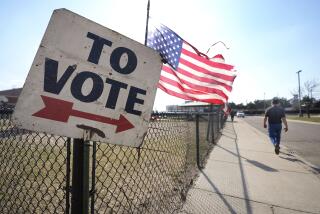Jeers then cheers by Arab citizens of Israel
- Share via
UMM AL FAHM, ISRAEL — The weather at Razi Elementary School was depressing -- a driving winter rain mixed with occasional hail that soaked prospective voters as soon as they stepped out of their cars.
Inside the school, local politicians fretted about the possibility of a record low turnout here in Israel’s second-largest Arab city, and among Arab voters nationwide. On the streets, a protest against a right-wing Israeli politician serving as an election supervisor here briefly turned violent.
Farouk Mahajiny, an official of the Democratic Front for Peace and Equality, a party that includes Arabs and Jewish socialists and has three seats in the Knesset, or parliament, worried that participation here might not top 30%.
“This is a serious danger to all the Arab parties,” Mahajiny said.
At the end of the day, however, Arab politicians said they were thrilled that exit polls indicated turnout of at least 50% -- close to the 56% who turned out in 2006 and enough to ensure that Arabs would keep their voice in the Knesset.
Israel’s 2006 conflict with the Lebanese militant group Hezbollah, the recent three-week offensive in the Gaza Strip and a week of violent Arab-Jewish clashes last fall in the mixed city of Acre have helped sharpen the sense of alienation among the one-fifth of Israel’s citizens who are Arabs.
Among Jews, tension with Arabs has partially fueled the rise of ultranationalist candidate Avigdor Lieberman, who advocates forcing Arab citizens to take a loyalty test. Lieberman succeeded in getting the two most prominent Arab parties, Balad and United Arab List-Taal, temporarily pulled from the ballot. The ruling was later overturned by the Supreme Court.
Party leaders here feared that Arab frustration could lead many to support fringe parties, boycott all elections or abandon the idea of democratic involvement in the Jewish state.
Voter participation among Israel’s 1.4 million Arab citizens has always lagged behind that of Jewish voters, and the turnout in 2006 represented a drop of 21 percentage points from elections a decade earlier.
In Umm al Fahm, the figure is generally even lower because of long-standing boycott campaigns by a pair of powerful local political movements, the Islamic Movement of the North and the Sons of Our Land.
Election day in Umm al Fahm, population 43,000, began amid tense confrontation.
Residents had been up in arms for days over the national electoral committee’s decision to allow extreme right-wing politician Baruch Marzel to serve as a polling place supervisor here. At dawn, crowds had gathered at the city’s main entrance, blocking traffic and outnumbering the local police forces, participants said.
“Every car that passed, we would inspect it to make sure [Marzel] wasn’t in it,” said Anas Mahajiny, 19.
Police commanders decided to block Marzel’s entry, citing a possible threat to public safety. The protesters dispersed.
Then word spread that the police had led another right-wing politician, Aryeh Eldad, through back roads to Razi Elementary to serve as Marzel’s replacement. A second crowd gathered. Five people were arrested and several injured in a confrontation with police, including Anas Mahajiny, who sported a fresh pink wound on the back of the head.
Eldad left the school after less than an hour, as the crowd threw rocks at his police convoy, witnesses said.
Around the corner from the school, Abdel Rahman Moustafa’s grocery store was open for business. He wasn’t voting.
“I don’t see the necessity of closing my store and standing in line for an hour,” Moustafa said. “If I thought it would make a difference, I’d do it.”
“There’s a trend of disillusionment with politics,” said Ahmad Sa’di, a political science professor at Ben-Gurion University of the Negev. “They believe the system is incapable of including them.”
But as the polls closed Tuesday night, those fears proved to be exaggerated; turnout appeared to be high enough for all main Arab parties to at least maintain their current numbers in parliament.
In light of the dire predictions, many were willing to declare the day a resounding victory.
“This is a clear and unequivocal statement against boycotting, and an expression of faith in us, the Arab leadership,” Ahmed Tibi of the United Arab List-Taal said in a radio interview.
“Nobody expected this,” said Farouk Mahajiny by telephone late Tuesday night amid the sound of raucous cheering.
--
More to Read
Sign up for Essential California
The most important California stories and recommendations in your inbox every morning.
You may occasionally receive promotional content from the Los Angeles Times.










